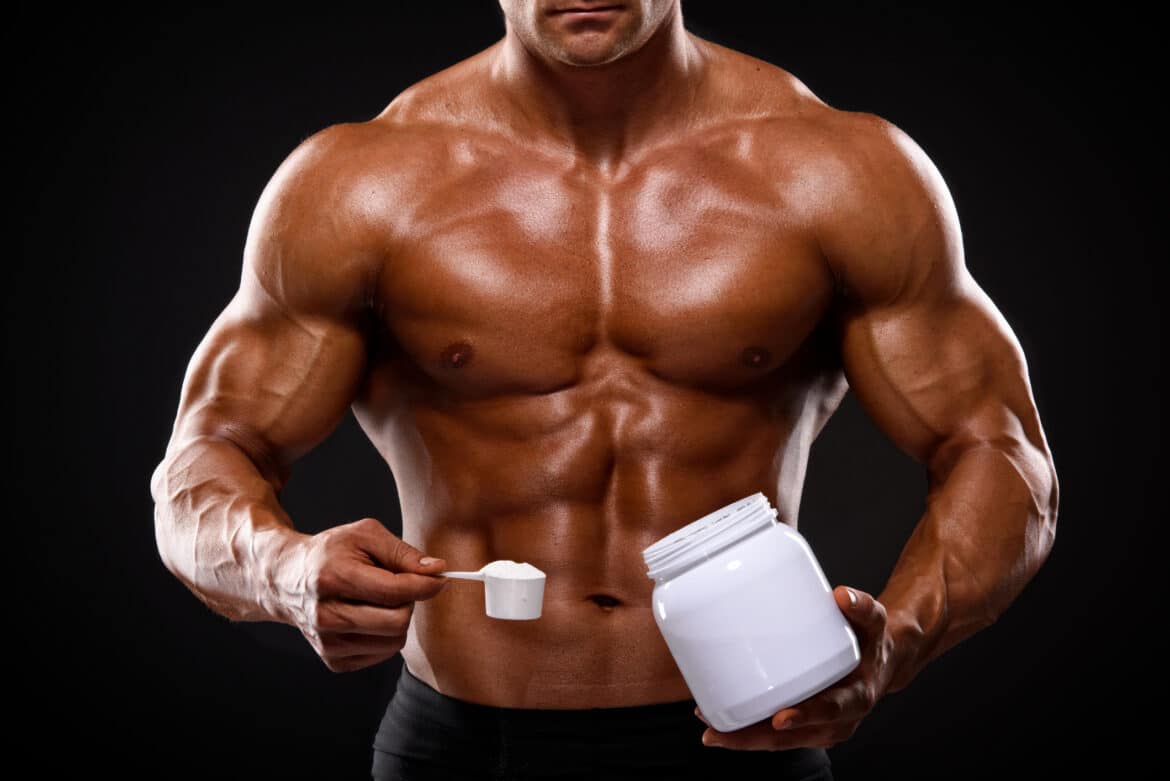Introduction
Is Creatine Natural Bodybuilding: Creatine, a naturally occurring compound found in small amounts in various foods and synthesized within the human body, has emerged as a prominent player in the world of natural bodybuilding. It is a molecule composed of three amino acids: arginine, glycine, and methionine. While creatine is indeed a naturally-occurring substance, it has garnered immense attention and popularity among fitness enthusiasts and athletes, particularly those pursuing natural bodybuilding endeavors.
Natural bodybuilding emphasizes the use of wholesome, unadulterated approaches to physique development, steering clear of synthetic substances and performance-enhancing drugs. In this context, creatine stands out as a supplement that aligns with the principles of natural bodybuilding. It offers a safe and effective means to enhance physical performance, strength, and muscle growth without resorting to the use of synthetic compounds.
This introductory exploration into creatine’s role in natural bodybuilding will delve into its origins, mechanisms of action, benefits, and how it fits within the framework of ethical and natural bodybuilding practices. As we delve deeper into the world of creatine, we’ll uncover its potential as a tool for those seeking to sculpt their bodies through dedication, discipline, and a commitment to natural, healthy fitness practices.

What is creatine, and where does it come from?
Creatine is a naturally occurring compound found in small amounts in foods like meat and fish. It is also synthesized within the human body, primarily in the liver, kidneys, and pancreas.Creatine is a naturally occurring compound that plays a crucial role in energy metabolism, particularly during short bursts of intense physical activity. It can be found in trace amounts in various food sources, with meat and fish being particularly rich sources of creatine. Red meat, in particular, contains higher concentrations of creatine compared to white meat or fish.
Apart from dietary sources, creatine is also synthesized within the human body. It is primarily produced in specific organs, including the liver, kidneys, and pancreas, through a series of enzymatic reactions involving three amino acids: arginine, glycine, and methionine. Once formed, creatine is transported via the bloodstream to muscles, where it is stored and readily available for energy production.
How does creatine work as a supplement?
Creatine helps increase the body’s production of adenosine triphosphate (ATP), which is essential for muscle contractions. This can lead to improved strength and power during workouts.Creatine functions as a supplement by enhancing the body’s capacity to produce adenosine triphosphate (ATP), a molecule that serves as the primary source of energy for muscle contractions.
ATP as an Energy Currency: During physical activities, especially high-intensity exercises like weightlifting or sprinting, muscles require a rapid and substantial supply of energy. ATP is the molecule that provides this energy for muscle contractions.
Limited ATP Stores: Muscles have a limited amount of ATP readily available for immediate use. When engaged in intense exercise, these ATP stores can be quickly depleted.
Creatine’s Role: Creatine supplementation comes into play by increasing the body’s creatine phosphate stores. Creatine phosphate is a compound that can quickly donate its phosphate group to ADP (adenosine diphosphate) to regenerate ATP. In essence, it helps replenish ATP levels more rapidly.
Enhanced Energy Production: With elevated creatine phosphate levels, the muscles can generate ATP more efficiently during high-intensity exercise. This leads to improved strength and power output, allowing individuals to lift heavier weights, perform more repetitions, or sprint faster and longer.
Is creatine safe for natural bodybuilders?
Yes, creatine is considered safe when used within recommended doses. It has been extensively studied, and no significant adverse health effects have been reported.Yes, creatine is generally considered safe for natural bodybuilders when used as recommended. It has undergone extensive research and has been studied for its safety and efficacy in a variety of populations, including athletes and fitness enthusiasts.
Numerous scientific studies and reviews have consistently found that creatine supplementation, when taken within the recommended dosage guidelines, does not pose significant health risks. Common side effects, if any, tend to be mild and may include temporary water retention or gastrointestinal discomfort in some individuals.
Does creatine cause water retention or bloating?
Some individuals may experience mild water retention when first starting creatine, but it is generally temporary and related to increased muscle hydration. It does not lead to unhealthy levels of bloating.Yes, it’s true that some individuals may experience mild water retention when they first start taking creatine as a supplement. However, it’s important to understand that this water retention is typically temporary and not the same as unhealthy bloating.
Here’s why this happens:
Increased Muscle Hydration: Creatine has the ability to draw water into muscle cells. As a result, when you start taking creatine, it can lead to an initial increase in the water content within your muscles.
Temporary Effect: This increase in muscle hydration is usually temporary and should not be confused with bloating in the digestive system. It’s a positive effect because well-hydrated muscle cells can perform better and are less prone to muscle cramps and injury.
Individual Variability: Not everyone experiences this effect to the same degree, and some may not notice it at all. It tends to vary from person to person.
Hydration Matters: Staying well-hydrated while using creatine can help minimize any potential water retention and ensure that the water is directed toward muscle cells, where it’s beneficial.
Is creatine considered a natural supplement?
Yes, creatine is considered natural in the sense that it is found naturally in food and can be synthesized by the body. It is a popular choice among natural bodybuilders.
Creatine is indeed considered a natural supplement in the context of sports and fitness. It is regarded as such because of its dual origin: it can be obtained from dietary sources as it naturally occurs in foods like meat and fish, and it can also be synthesized by the body, primarily in the liver, kidneys, and pancreas. This synthesis process involves the combination of three amino acids: arginine, glycine, and methionine.
Creatine’s natural presence in both our diets and within our bodies aligns with the principles of natural bodybuilding, which emphasizes using wholesome, unadulterated approaches to physique development. It is a popular and well-accepted supplement among natural bodybuilders and athletes who prefer to avoid synthetic compounds or performance-enhancing drugs.
What are the benefits of creatine for natural bodybuilders?
Creatine supplementation can enhance strength, increase muscle mass, and improve exercise performance, making it a valuable tool for natural bodybuilders looking to optimize their results.Creatine offers several notable benefits for natural bodybuilders who are committed to achieving their fitness goals through ethical and natural means.
Improved Muscle Strength: Creatine supplementation has been shown to significantly enhance muscular strength, allowing individuals to lift heavier weights and perform more challenging resistance exercises. This can accelerate muscle growth and development.
Increased Muscle Mass: Creatine has the potential to increase muscle hypertrophy (growth) by promoting greater water retention within muscle cells and stimulating protein synthesis. Over time, this can lead to an increase in lean muscle mass.
Enhanced Exercise Performance: Creatine enables muscles to produce energy more efficiently during high-intensity, short-duration activities like weightlifting and sprinting. This leads to improved workout performance, enabling natural bodybuilders to push themselves harder and achieve better results in their training.
Faster Recovery: Some research suggests that creatine may help reduce muscle damage and inflammation following intense exercise, potentially leading to faster recovery times between workouts.
Increased Anaerobic Capacity: Creatine can improve performance in anaerobic activities, such as sprinting and jumping, by providing a rapid source of energy for explosive movements.
How should creatine be used for maximum effectiveness?
The most common dosing regimen is 3-5 grams per day, typically taken post-workout or with a meal. Some individuals also “load” by taking higher doses for the first week.To maximize the effectiveness of creatine supplementation, it is important to follow a proper dosing regimen.
The most commonly recommended approach is as follows:
Loading Phase (Optional): Some individuals choose to start with a loading phase, which involves taking a higher dose of creatine for the first few days. This loading phase saturates the muscles with creatine more quickly. A typical loading phase involves taking 20 grams of creatine divided into four doses (5 grams each) throughout the day for 5-7 days.
Maintenance Phase: After the loading phase (or if you choose to skip it), you can transition to a maintenance phase where you take a lower daily dose to maintain elevated creatine levels in your muscles. The standard maintenance dose is 3-5 grams of creatine per day.
Timing: Creatine can be taken at any time of day, but some people prefer to take it post-workout or with a meal. Taking it with a meal that includes carbohydrates can enhance creatine absorption.
Consistency: It’s important to be consistent with your creatine supplementation. Taking it daily, even on rest days, helps maintain elevated creatine levels in your muscles.
Hydration: Ensure you stay adequately hydrated while using creatine. Since it can increase muscle hydration, it’s important to drink enough water to support this process and overall health.
Can creatine be combined with other supplements in natural bodybuilding?
Yes, creatine is often used alongside other supplements like protein, branched-chain amino acids (BCAAs), and vitamins. Combining these supplements can support overall muscle growth and recovery.Absolutely, creatine can be effectively combined with other supplements in the context of natural bodybuilding to optimize muscle growth, recovery, and overall performance.
Here are some common supplement combinations:
Protein: Combining creatine with a high-quality protein supplement, such as whey protein, can enhance muscle protein synthesis. Protein provides the essential amino acids necessary for muscle repair and growth, while creatine complements this process by improving energy availability during workouts.
Branched-Chain Amino Acids (BCAAs): BCAAs are essential amino acids that play a crucial role in muscle protein synthesis and recovery. Combining creatine with BCAAs can support muscle growth and reduce muscle soreness, especially when consumed during or after workouts.
Beta-Alanine: Beta-alanine is another amino acid that can enhance muscular endurance and reduce fatigue during high-intensity exercise. Combining beta-alanine with creatine may provide synergistic benefits for performance in activities like weightlifting and sprinting.
Multivitamins and Minerals: A well-rounded multivitamin and mineral supplement can ensure you’re meeting your daily micronutrient needs, which is important for overall health and energy production. Creatine works in conjunction with these nutrients to support various metabolic processes.
Carbohydrates: Consuming carbohydrates before or after workouts can enhance creatine uptake by muscle cells. This combination ensures that the creatine you ingest is effectively transported into the muscles, where it can have the greatest impact on energy production.

Conclusion
Creatine unquestionably stands as a valuable asset in the realm of natural bodybuilding. As a naturally occurring compound found in foods like meat and fish, as well as being synthesized within the human body, creatine aligns seamlessly with the principles of natural bodybuilding. It embodies the essence of wholesome and ethical approaches to physique development.
The benefits of creatine for natural bodybuilders are well-documented and compelling. Its capacity to enhance muscle strength, promote lean muscle mass, improve exercise performance, and contribute to faster recovery makes it a sought-after supplement among fitness enthusiasts committed to achieving their goals through dedication and discipline.
Creatine’s safety profile, backed by extensive research, further solidifies its status as a trustworthy and widely accepted supplement in the natural bodybuilding community. When used responsibly and in conjunction with a well-structured training program and balanced nutrition, creatine can be a powerful tool for individuals striving to sculpt their bodies naturally, setting the stage for greater success and accomplishment in the world of natural bodybuilding.


1 comment
… [Trackback]
[…] Read More here on that Topic: thefitnessblogger.com/is-creatine-natural-bodybuilding/ […]